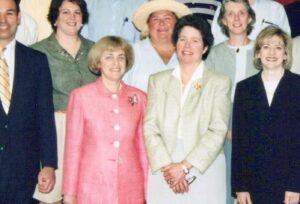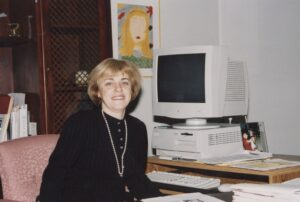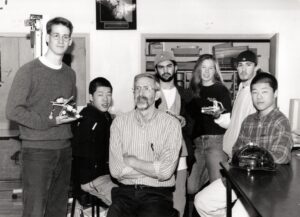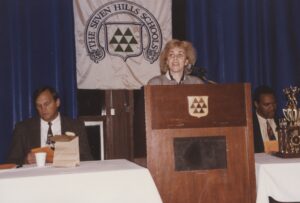Debbie Reed
I only knew one family in Cincinnati when a friend called me in the summer of 1994 and said, “There’s an opening at Seven Hills, and if you’re interested, I’m going to recommend you.” At the time, I was the head of the Middle School division at Harvard-Westlake in Los Angeles. I said, “Yes.”

Later, the search consultant running the process called me and said, “Somebody’s recommended you, but I don’t think you have much of a chance.” What did I know, I’d never applied for another head of school position. I came to campus, met the search committee, and liked all the people I met — Karen Horrell, John Brooks Sr., Susan Marrs, Tory Parlin, and Tom Hayes, who was board president at the time. My sister came to town, too, and Jack Horrell gave us a tour of campus. It was beautiful weather, and I remember him saying to me, who was coming from California, “Oh, yeah, this is how it is all the time here — gorgeous, sunny, beautiful days.”
Something that distinguished Seven Hills from the beginning was that the interview dinners with the trustees were in people’s homes, and they cooked the meals. A lot of schools — especially in New York or Los Angeles — they take you out to some fancy restaurant. To me, it said everything about the kind of community Cincinnati is, and it gave a sense of the school’s values. One of the two finalist dinners was at Tory Parlin’s house, and her husband John was so concerned that I hadn’t eaten anything because people were peppering me with questions that he gave me a little bag of Tory’s cookies to take back to my hotel. It all showed me that people cared about the person who was applying to lead the school, not just the resume of the person. If you were just looking at resumes, the search consultant was correct, nobody would have hired me.
As part of the interview process, I met with the whole Upper School at morning assembly, and the kids were allowed to ask me questions. One of the students asked me to talk about something that I wouldn’t miss, and I said, “If I become Head of School, I’m never going on an outdoor school camping trip again!” The kids laughed, and I laughed. It was a moment where I knew I could be at this school. You can’t lead a school unless you feel connected to the faculty and the kids — and I did.
The following summer, when I flew into town to start the job, several parents and a teacher came to meet me at the airport. They said, “We don’t think anyone should arrive and not have someone there to say hello to them.” Shannon Carter dropped off a box of Procter & Gamble cleaning products that I would need at my new house. Jimmy Marrs left me a list of doctors that I might want to contact. It was like being a part of the community immediately.

A lot charged during my seven years at the school. When I arrived, there wasn’t a computer on the head of school’s desk. We helped get the school online with a fully functioning computer network and an enterprise-wide database, which took a lot of time from a lot of people. It was also immediately clear to me that the Upper School building needed attention. David Abineri — one of the great teachers of all-time — had some students bring me to his classroom, where there was ice on the inside window. I don’t even remember how cold it was in his classroom. The temperature in the Upper School hallway was below 60 degrees. Kids would sit in those classrooms wearing coats and mittens.
I remember being in the little office that I had at Doherty with Steve Black, who’d become board chair, and Lee Carter. I had a rough estimate of what it would cost to fix up the Upper School and add on to it. Lee said, “What do you think it would cost to do a whole new building?” He said, “Why would we throw money into this building, when we could have something that would serve us better and probably be less expensive?” We took it to the board of course, but the decision to build a whole new Upper School was really born right there.

I’ve had the honor being an administrator at three of the country’s top schools, and through other accreditation observation processes, gotten to know many other top schools. I can say that the best elementary education of any place I’ve ever been was at Lotspeich and Doherty. I loved the open-air facility in Lotspeich, with doors that opened to the outside in every classroom, and everybody along those two central coordinators with the library in the middle. At Doherty, I loved the cross-grade homerooms, with the ability to mix kids, so depending on their needs, they could be in a first grade reading group and a second grade math group.
The faculty members at Seven Hills were just incredible. Their pedagogy and knowledge base were excellent, they were always learning and growing, they liked kids, and they were kind colleagues. To have a Turansky — oh my gosh, what a gift that man was to kids. Wynne Curry! As a language department chair and as a college counselor, she was the one who said, you know, we really need to think more about students’ learning differences. Sandy Smythe! Is there a better English teacher on this planet? Dianne Kruer! Is there a better art teacher on this planet?

The faculty in the Upper School used to gather for lunch in what was the smallest faculty room known to humankind. I remember there was a “Question of the Day” that David Abineri used to bring forward. In faculty rooms at some schools, they’d be grumbling about something. At Seven Hills, they were talking about an issue, a topic, solving a problem. It set the tone, especially for the young faculty. And they were all so committed to the school. David Abineri could have gotten a job somewhere else where he wasn’t freezing in his classroom. Instead — I’ll never forget it — every single year, when we were determining the school calendar, I got a letter from David Abineri asking for more school days. He wrote this letter every year, and it was all about the need to educate kids and having more time with them in the classroom.

I also saw how you never lead a great institution like Seven Hills by yourself. Was I going to tell Patti Guethlein how to run her division? I’m not that crazy! Was I going to tell Susan Marrs how to run college counseling? No! I quickly depended on everyone because everyone was so good. I fully immersed myself in the life of the school, and the school let me. That sense of connection, that’s what kept so many faculty there for years and years. You felt like you were part of a village.

